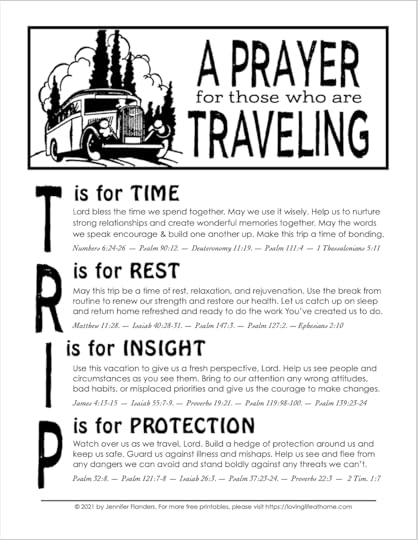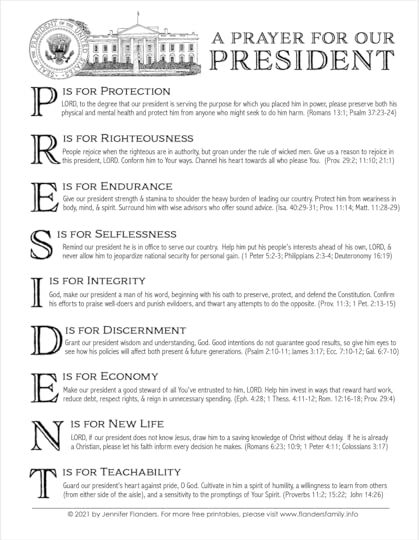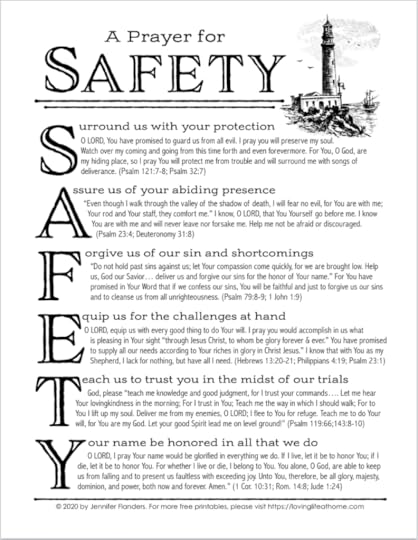Jennifer Flanders's Blog, page 16
June 16, 2021
A Prayer for Fathers (Free Printable)

Today’s post was inspired by one of my readers. While writing to thank me for all my free printable prayer guides, she noted that I hadn’t published a prayer for fathers and requested I make one ASAP.
Since Sunday is Father’s Day, now seems the perfect time to share what I came up with.
Most of the prayers I prayed as a child for my own father were reactive rather than proactive. When he was sick, I prayed he’d get well. When he was laid off, I prayed he’d find a new job. On more than one occasion, I prayed he’d change his mind when he said no to something I really wanted to do. To be honest, the idea of praying for my dad whether he “needed it” or not never even occurred to me until I was an adult.
So it blesses my heart to hear from young people who are committed to praying regularly for their fathers (and mothers, siblings, grandparents, etc). Because I’ve lived long enough now to know that God hears and honors those kind of proactive prayers!
A Prayer for FathersF is for FaithHelp Dad to put his full trust in you, O LORD. Give him an unshakeable faith in Your Word and strengthen his desire to read it, memorize it, and order his life according to Your precepts. Remind of Your promise to work all things together for good for those who love You and are called according to Your purpose. Keep him faithful, alert, and standing firm.
Psalm 25:2; Psalm 100:97-100; Romans 8:28; 1 Corinthians 16:13
A is for AttentionGod, help Dad focus his attention on what truly matters. Teach him prioritize, to number his days, and to invest his time wisely. Guard him against harmful or ungodly distractions. Give him eyes to see with an eternal perspective. Keep his mind fixed on whatever is true, honorable, right, pure, lovely, commendable, excellent, and praiseworthy.
Hebrews 3:1; Psalm 90:12; Psalm 121:7; Colossians 3:1-3; Philippians 4:8
T is for TestimonyMake Dad a man of integrity. Keep him mindful of the fact that others are watching, particularly the children you’ve entrusted to his care. Give him a good name and grant him the wisdom, discernment, and understanding he’ll need to lead his family well. May everything he does bring honor to You and point others to Jesus.
Proverbs 28:18; Psalm 119:1-2; Hebrews 12:1; Proverbs 22:1; Proverbs 2:6; 1 Corinthians 10:31
H is for HealthLORD, keep Dad in good health. Make his bones and muscles strong. Preserve his strength and vitality. Grant him good sleep and give him the rest he needs. Help him make good choices in areas that affect his health and either protect him against sickness and disease or give him grace to endure his physical afflictions in a way that glorifies You.
3 John 1:2; Proverbs 3:1-8; Isaiah 40:29-41; Psalm 127:2; 2 Corinthians 12:8-10
E is for EmploymentGod, give Dad meaningful work to do and a sense of purpose. Help him enjoy and excel at his job. Make him a wise steward of the gifts, skills, talents, opportunities, and money you’ve entrusted to him. May others be supportive and appreciative of the good work he does.
Psalm 90:17; Ecclesiastes 5:18-19; Proverbs 22:29; Luke 12:42-43
R is for RelationshipsBless Dad’s relationships, LORD. Fortify his family ties. Provide friends who uplift and encourage him. Help him get along with colleagues and coworkers. Most of all, strengthen his relationship to You. Give him a love for Jesus that spills out on everyone he meets.
Psalm 128:1-4; Proverbs 17:17; Mark 12:30-31
Want a printable version of this prayer for fathers? Click on the image below to download the free prayer guide.
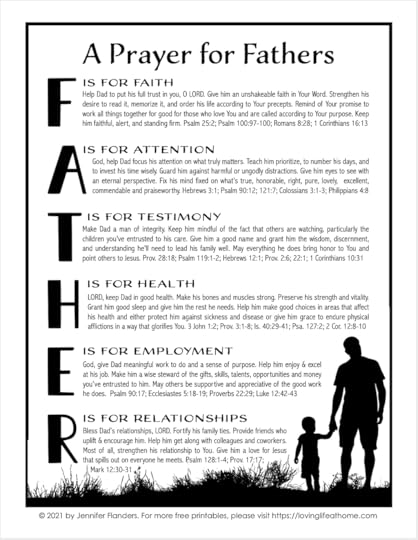
More Free Printable Prayer Guides
This Prayer for Fathers joins a long list of prayer guides I’ve published on this blog. Click through the links below to print out any of these guides.
Praying for Your Husband from Head to Toe31 Days of Praying Scripture over Your HusbandPraying for Your Wife from Head to ToeA Marriage PrayerA House BlessingPraying for Your Unborn ChildPraying for Your Children from Head to ToeYour Teens Need PrayerA Prayer for the GraduatePraying for Your Adult ChildrenPraying for Your GrandchildrenYour Parents Need PrayerA Prayer for the SickA Blogger’s PrayerPraying for Your CountryPraying for our PresidentA Prayer for the New YearA Prayer for RevivalPraying for Your PastorA Prayer for SafetyA Prayer for TravelersBack to School PrayerPraying Boldly for MyselfCan you think of a prayer guide you’d like to see that isn’t already listed? Tell me about it in the comment section below. I may use your idea for my next printable prayer.

The post A Prayer for Fathers (Free Printable) appeared first on Loving Life at Home.
June 9, 2021
Prayer for Travelers (Free Printable)

My family loves to travel, and we do a lot of it. But before we embark on any extended trip, I always email my mother a detailed itinerary of everything we’ll be doing while we’re away.
Before the advent of cell phones, I did this so Mom would know how to reach us if she needed to. But I continue to do it even now, because I know my mother prays for each member of my family every single day. And the more she knows about what’s going on in our lives, the more specifically she prays.
I’m convinced that Mom’s prayers are one of the primary reasons our vacations have always gone so smoothly. In that sense, she is the inspiration behind the free printable Prayer for Travelers I’m sharing today. These requests form an acrostic with the letters in T-R-I-P. Use it next time you travel and see if you notice any difference. 
“Lord bless the time we spend together. May we use it wisely. Help us to nurture strong relationships and create wonderful memories together. May the words we speak encourage & build one another up. Make this trip a time of bonding.”
Numbers 6:24-26; Psalm 90:12; Deuteronomy 11:19;Psalm 111:4; 1 Thessalonians 5:11
May this trip be a time of rest, relaxation, and rejuvenation. Use the break from routine to renew our strength and restore our health. Let us catch up on sleep and return home refreshed and ready to do the work You’ve created us to do.
Matthew 11:28; Isaiah 40:28-31; Psalm 147:3; Psalm 127:2; Ephesians 2:10
Use this vacation to give us a fresh perspective, Lord. Help us see people and circumstances as you see them. Bring to our attention any wrong attitudes, bad habits, or misplaced priorities and give us the courage to make needed adjustments.
James 4:13-15; Isaiah 55:7-9; Proverbs 19:21; Psalm 119:98-100; Psalm 139:23-24
Watch over us as we travel, Lord. Build a hedge of protection around us and keep us safe. Guard us against illness and mishaps. Help us see and flee from any dangers we can avoid and stand boldly against any threats we can’t.
Psalm 32:8; Psalm 121:7-8; Isaiah 26:3; Psalm 37:23-24; Proverbs 22:3; 2 Timothy 1:7
For a free printable version of this Prayer for Travelers, click on the image below:
click to print this Prayer for TravelersFun Travel Ideas for Families
If your family loves to go as much as mine does, check out my book Pack Up & Leave. It’s chockfull of smart tips that will make your next family road trip or vacation more economical, educational, and memorable.

The post Prayer for Travelers (Free Printable) appeared first on Loving Life at Home.
February 9, 2021
A Prayer for Our President (Free Printable)

Christians need to pray for our leaders (whether we voted them into office or not). To that end, I am sharing this free printable Prayer for Our President today.
Use it to pray when you don’t know what to pray. By so doing, you’ll be obediently following God’s clear command:
A Prayer for Our PresidentP is for ProtectionFirst of all, then, I urge that petitions, prayers, intercessions, and thanksgiving be offered for everyone — for kings and all those in authority — so that we may lead tranquil and quiet lives in all godliness and dignity. This is good and pleasing in the sight of God our Savior.” (1 Timothy 2:1-3)
LORD, to the degree that our president is serving the purpose for which you placed him in power, please preserve both his physical and mental health and protect him from anyone who might seek to do him harm. (Romans 13:1; Psalm 37:23-24)
R is for RighteousnessPeople rejoice when the righteous are in authority, but groan under the rule of wicked men. Give us a reason to rejoice in this president, LORD. Conform him to Your ways. Channel his heart towards all who please You. (Proverbs 29:2; 11:10; 21:1)
E is for EnduranceGive our president strength & stamina to shoulder the heavy burden of leading our country. Protect him from weariness in body, mind, & spirit. Surround him with wise advisors who offer sound advice. (Isaiah 40:29-31; Proverbs 11:14; Matthew 11:28-29)
S is for SelflessnessRemind our president he is in office to serve our country. Help him put his people’s interests ahead of his own, LORD, & never allow him to jeopardize national security for personal gain. (1 Peter 5:2-3; Philippians 2:3-4; Deuteronomy 16:19)
I is for IntegrityGod, make our president a man of his word, beginning with his oath to preserve, protect, and defend the Constitution. Confirm his efforts to praise well-doers and punish evildoers, and thwart any attempts to do the opposite. (Proverbs 11:3; 1 Peter 2:13-15)
D is for DiscernmentGrant our president wisdom and understanding, God. Good intentions do not guarantee good results, so give him eyes to see how his policies will affect both present & future generations. (Psalm 2:10-11; James 3:17; Ecclesiastes 7:10-12; Galatians 6:7-10)
E is for EconomyMake our president a good steward of all You’ve entrusted to him, LORD. Help him invest in ways that reward hard work, reduce debt, respect rights, & reign in unnecessary spending. (Ephesians 4:28; 1 Thessalonians 4:11-12; Romans 12:16-18; Proverbs 29:4)
N is for New LifeLORD, if our president does not know Jesus, draw him to a saving knowledge of Christ without delay. If he is already a Christian, please let his faith inform every decision he makes. (Romans 6:23; Romans 10:9; 1 Peter 4:11; Colossians 3:17)
T is for TeachabilityGuard our president’s heart against pride, O God. Cultivate in him a spirit of humility, a willingness to learn from others (from either side of the aisle), and a sensitivity to the promptings of Your Spirit. (Proverbs 11:2; 15:22; John 14:26)
click to print prayer
If you love the LORD, love our country, and love American history, then check out God Bless America, my devotional journal made especially for patriots like you!
Every page features beautiful vintage artwork along with a scripture verse, writing prompt, or historical quote meant to inspire you to think deeply about what it means to be an American and how we can ensure the guiding principles upon which our nation was established are never forgotten.
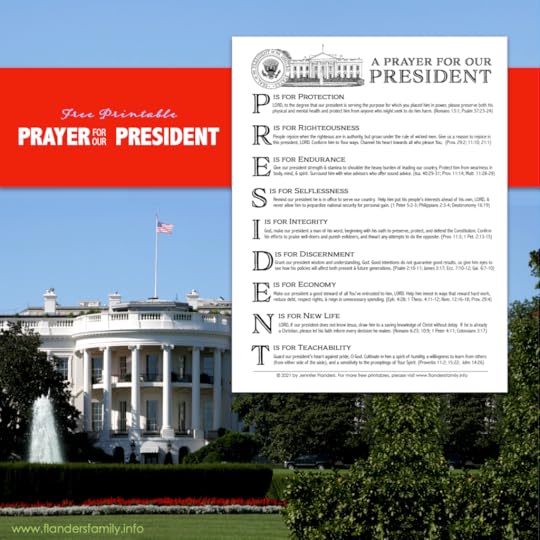
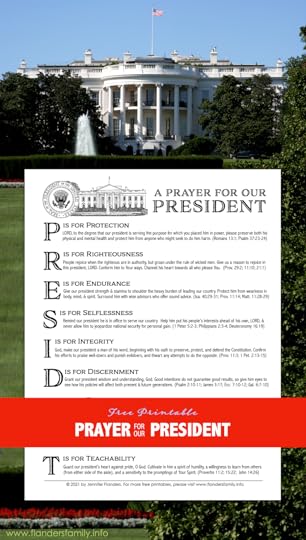
The post A Prayer for Our President (Free Printable) appeared first on Loving Life at Home.
January 22, 2021
Roe v Wade: A False Compassion
Today marks the 48th anniversary of Roe v Wade. That’s forty-eight years of legalized abortion in the United States. Forty-eight years of championing “a woman’s right to choose.” Forty-eight years of slaughtering our unborn.
For the majority of those forty-eight years, the lines on this issue were clearly drawn. It was a question of life or death. Right or wrong. Either you respected the tiny humans inside the womb and sought to protect them, or you spurned “the products of conception” and fought for the power to snuff them out at will.
Lately, however, that distinction has become blurred.
Liberals have abandoned their self-professed goal of making abortions “legal, safe, and rare.” Instead, they’re relentlessly pushing to remove every obstacle to the unrestricted slaying of innocents, while simultaneously advancing the notion that theirs is the more compassionate, life-affirming position.
That’s doublespeak if I’ve ever heard it. A lie straight from the pit of hell. It takes everything we know to be true and stands it on its head.
Sadly, this backward thinking has now infiltrated the church. Well-meaning Christians have been duped into believing that abortions can be offered in service to God. That true compassion for the poor demands we provide them a means by which they can kill their babies. That babies aren’t really a blessing from God, as the Bible asserts, but an unnecessary burden.
I first saw this view articulated by a former pro-life advocate almost two years ago. A left-leaning friend sent me an opinion piece written by Rob Schenck in defense of Roe v Wade. She wanted to know what I thought about it.
As I explained to my friend, I take issue with this author on a number of points. And though I considered publishing my response as an open letter to the author at the time, I opted not to do so.
I was hoping the views Schenck so smoothly articulated were an aberration. Little did I dream that this false compassion would soon have such a stranglehold on the church that even some of my own, well-meaning friends — friends I love and respect but with whom I vehemently disagree — would vote for the most aggressively pro-abortion administration our country has ever known.
It may be too little, too late, but this is what I have to say, both to Schenck and to anybody else who claims to be pro-life, but isn’t.
You can’t have it both waysYou cannot be “personally against abortion” and simultaneously approve it. If you were truly horrified by the murder of innocents, you could not heartily endorse the practice.
Clearly, Schenck is equivocating with respect to his views on this matter:
“No doubt, many of my former allies will call me a turncoat. I don’t see it that way. I still believe that every abortion is a tragedy and that when a woman is pregnant, bringing the child into the world is always ideal.”
But this statement follows in the wake of a 637-word explanation of why he presently champions a court decision that he previously spent “more than 30 years” fighting to overturn — a ruling he now touts as “pro-life.”
Despite the fact Roe v Wade has led to nearly 62 million US abortions since 1973 when it was first handed down, Schenck has the audacity to suggest that its repeal would “be destructive to life.”
So it’s obvious his beliefs have changed. They’ve radically changed. Schenck has done a night-and-day, 180-degree about-face, as his own testimony proves. To pretend otherwise is deceptive and wrong.
Learn to think outside the boxRarely are there only two options for dealing with crisis pregnancies. Schenck is presenting a false dilemma. He writes:
“I can no longer pretend that telling poor pregnant women they have just one option — give birth and try your luck raising a child, even though the odds are stacked against you — is ‘pro-life’ in any meaningful sense.”
This is a gross misrepresentation. I’d like for Schenck to show me even one Christian-based crisis pregnancy center that has ever told a pregnant woman she has no other option but to raise her baby in abject poverty completely cut off from help of any kind. That may be the only alternative to abortion Planned Parenthood paints for their clients, but it’s an outright lie, regardless who says it.
Had Schenck spent less time picketing abortion clinics and shoving fetuses in the faces of presidential candidates and more time serving the needs of women in crisis, he would know abortion is not the only option. By presenting this scenario as an either/or proposition, he is being intentionally close-minded. He shows no creativity, no effort, no willingness to brainstorm solutions that would take into account the welfare of both mother and baby.
The crisis pregnancy centers with which I’m most familiar provide many viable alternatives to abortion.
If a mother wants to keep her baby, they will give her a place to live during the pregnancy, arrange for free prenatal care, furnish maternity clothes, provide parenting/life skills classes, and even help with GED prep and job training. They offer continued care, counseling, and educational classes after birth and also provide free diapers and baby clothes, cribs, and other essentials.
If a mother doesn’t feel up to the task of raising her baby, they will help with adoption placement or arrange for foster care until she can get on her feet.
And all of this is tangible, practical, life-affirming help that arises from genuine compassion — not fake (or misguided) compassion that is willing to slaughter babies rather than see them born into less-than-ideal circumstances.
Don’t throw the baby out with the bathwaterThis brings me to a third problem with Schenck’s article: His proffered solution is far worse than the problem he’s attempting to address.
One evil doesn’t justify another evil. Just as the dire financial straits, humiliation, and political unrest that Germany faced because of WWI reparations did not justify killing all the Jews and stealing their assets, so “poverty, social marginalization, and bald-faced racism” do not justify wiping an entire generation of children out of existence.
Instead of targeting root problems, abortion attacks innocent victims.
Can you imagine what outrage would ensue if conservationists took such an approach to endangered species? “Oh, these poor tigers. Their habitat isn’t what it should be. Their cubs will face scarcity. They’ll be in constant danger from poachers. If they manage to survive to adulthood, they may pose a threat to society. Why don’t we just shoot them all now?”
Such thinking would be anathema to animal lovers, but it passes as humanitarian by Schenck’s warped reasoning.
Get off your high horseMy fourth problem with Schenk’s article is his elitism. He writes:
“What is ‘pro-life’ about forcing the birth of a child, if that child will enter a world of rejection, deprivation and insecurity, to say nothing of the fear, anxiety and danger that comes with poverty, crime and a lack of educational and employment opportunities?”
This is nothing more than white privilege masquerading as social justice. How do we judge the value of life? By affluence? If people live on the wrong side of the railroad tracks, does that mean they’re not deserving of life?
Many rightly compare abortion to genocide. This is racism at its worse. Indeed, blacks and Hispanics are disproportionately affected by abortion. Black teens are four times more likely to get an abortion than whites, and twice as likely as Latinas.
Planned Parenthood’s founder, Margaret Sanger, had utter contempt and disdain for such individuals and viewed abortion as a means of “pulling human weeds” as she so callously called them. We now see Sanger’s dream being played out in our inner cities every day of the week.
[Here’s an even better source for truly horrific Sanger quotes. I also recommend you read this excellent article on how abortion targets minority children. It contains some sobering statistics and a couple of compelling quotes — one from John Piper and the other from Jesse Jackson (made before Jackson, like Schenck, flip-flopped on this issue).]
Stick to the factsThe fifth thing I dislike about Schenck’s column is its patronizing tone. True, the straw men he’s constructed can be easily knocked down. But they are grossly inaccurate representations of his real opposition. Schenck writes:
“I’d like to think that the churches and pro-life organizations I worked with for those 30 years would provide the necessary tens of millions of dollars, thousands of volunteer hours, extensive social services, medical and dental care, educational support, food, clothing and spiritual assistance. But I suspect — frankly, I know — that they cannot or will not….To my former allies who are cheering on the challenges to Roe, I say: Put your money where your mouth is. Devote yourself and your considerable resources to taking care of poor women and their children before you champion laws that hem them into impossible situations.”
To this I say, why not both? Why not care for the poor and champion laws that protect the unborn? My family has personally contributed in every way Schenck mentions: My husband has provided free medical care. My second- and third-born have given free dental care. My daughters have tutored orphans and foster kids and served at Crisis Pregnancy Centers. I’ve taught homemaking, parenting, craft, and Bible classes to impoverished mothers and children.
We don’t have tens of millions to give, but we’ve certainly donated tens of thousands of dollars, in addition to food, diapers, books, and clothing, and we’ve worked hundreds of volunteer hours. Together with our children, we’ve painted houses, stocked food pantries, cooked meals, served at homeless shelters, provided entertainment (including face painting and manning a dunking booth), carted equipment, sponsored children, organized donations, purchased supplies, hosted fundraising dinners, and financially supported a variety of ministries that serve the needy in a variety of ways.
And our family is not atypical in this respect. We have Christian friends who’ve done all these things and more, including several who serve as foster families and even more who have adopted (multiple children and many with special needs).
So Schenck’s pretending that conservatives are unable or unwilling to help is blatantly false. We are helping. We help on multiple fronts in multiple ways. According to The New York Times, religious conservatives out-do secular liberals across the board when it comes to giving: not only do we give more money, but we are also more likely to volunteer and/or donate blood.
Be careful whom you call a foolMy last beef with Schenck is the name-calling he does in his final paragraph:
“Passing extreme anti-abortion laws and overturning Roe will leave poor women desperate and the children they bear bereft of what they need to flourish. This should not be anyone’s idea of victory. Anyone who thinks otherwise is indeed a fool.”
Calling anybody who disagrees with one’s conclusions “a fool” is presumptuous and overbearing (not to mention forbidden in Scripture — Matthew 5:22) This is particularly true considering the fact the arguments Schenck makes in support of his “enlightened” new stance on abortion are so riddled with logical fallacies.
About the only thing in this entire article that rings true are the two sentences the author quotes from the book of James:
“If a brother or sister is poorly clothed and lacking in daily food, and one of you says to them, ‘Go in peace, be warmed and filled,’ without giving them the things needed for the body, what good is that? So also, faith by itself, if it does not have works, is dead.” (James 2:15-17)
I love the book of James. When I was younger, I memorized the whole thing, and I can still quote long portions of it. Christians do have a responsibility to care for the practical needs of the poor — and killing the poor off through abortion does not absolve us of responsibility in this area.
Schenck would do well to take the rest of the book (as well as the whole of Scripture) to heart. Elsewhere James warns, “Whoever keeps the whole law but stumbles at just one point is guilty of breaking all of it.” (James 2:10)
And Schenck is definitely stumbling on this one point. When we look at Scripture in its entirety, we see that God is overwhelmingly pro-life. (Psalm 139:13-16, Job 31:15) Children are viewed as a blessing. (Psalm 127:3) Jesus drew the little children to Himself. (Mark 10:14) Unborn children were protected by law. (Exodus 21:22-25) And believers are charged with speaking up for those who have no voice (Proverbs 31:8-9) and defending those who are oppressed and dying:
“Rescue those being led away to death and restrain those stumbling toward the slaughter. If you say, ‘Behold, we did not know about this,’ does not He who weighs hearts consider it? Does not the One who guards your life know? Will He not repay a man according to his deeds?” (Proverbs 24:11-12)
The post Roe v Wade: A False Compassion appeared first on Loving Life at Home.
December 30, 2020
A Prayer for the New Year (Free Printable)

Whether you watch the hands of the clock count down to midnight or turn in early so as to greet the future feeling rested and refreshed, I can think of no better way to ring in the coming year than on your knees.
To that end, I offer the following prayer for the New Year. This petition represents the deepest longings of my heart. I hope it will resonate with you, as well.
A Prayer for the New Year
Lord, please bless the coming year. Help me to use my time wisely and strengthen my resolve to consistently do all of the following:
Never stop praying (1 Thessalonians 5:17)
Lord, teach me to pray without ceasing. Remind me to make prayer my first response rather than a last resort. Conform me to the image of Christ, that I might with Him pray, “Not my will, but Thine be done.”
Encourage one another (1 Thessalonians 5:11)
Lord, open my eyes to the needs of those around me. Help me to love my neighbors as I love myself and to put their interests ahead of my own. May every word I speak edify and uplift and point others to You.
Work without complaining (Philippians 2:14)
Place a guard on my mouth. God, that I might not grumble about the tasks I’ve been given to do. Help me to serve others with gladness and do my work heartily and cheerfully, as a sacrifice of praise unto You.
Yearn for Christ’s return (Mark 13:32-33)
Lord, keep me mindful of the fact that my hope is not rooted in social movements or political reform, but in Christ alone. Speed the day of His return and let me be found faithfully doing His work when He appears.
Evangelize the lost (Mark 16:15)
Give me a heart for those who don’t know You, God. May I boldly and urgently proclaim the gospel of grace and forgiveness of sins that is freely available to all who confess Jesus is Lord and believe You raised Him from the dead.
Acknowledge Him (Proverbs 3:5-6)
Don’t let me outlive my love & devotion to You, Lord. Let my life serve as an example of what it means to trust You fully. May all I do and say and hope and think bring glory and honor to Your precious, holy name.
Redeem the time (Ephesians 5:15-16)
“Lord, teach us to number our days, that we might apply our hearts to wisdom.” Don’t let me squander my time on earth. Show me how to invest it wisely in activities and pursuits that will bear fruit for all of eternity.
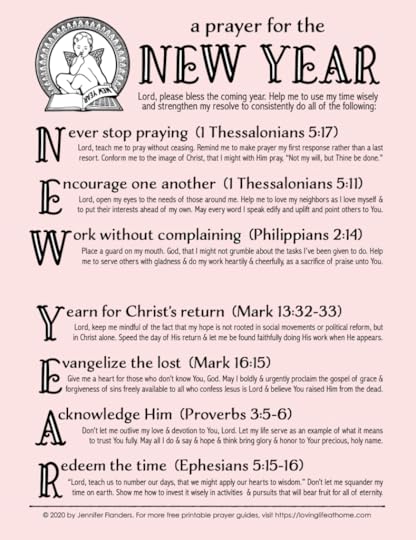
click to print Prayer for the New Year
Want more Bible-based prayers like this one? You may download and print as many as you like here: Free Printable Prayer Guides
And if you’d like more resources for making the coming year your best yet, check out my Life Balance Bundle, on sale for a limited time at a drastically reduced price.


The post A Prayer for the New Year (Free Printable) appeared first on Loving Life at Home.
November 25, 2020
What Men Intend for Evil

Do you ever tire of living with uncertainty? Do you grow weary of praying for justice? Or get disheartened when you see the wicked prevail? Whether you are observing a divisive political contest or fighting a more personal battle, take courage! God has a long history of preempting what men intend for evil and orchestrating it for good. (Genesis 50:20)
For the LORD is sovereign over the affairs of man. (Daniel 4:17) Nefarious schemes never take Him by surprise. (Job 34:21-22) Rather, whatever evil has been plotted against us, He uses to strengthen our faith (James 1:2-3), deepen our dependence on Him (Psalm 55:22), conform us to the image of Christ (Romans 8:28-29), and enable us to stand boldly for what is right. (Acts 4:29)
The poem I’ve written and recorded below highlights many such instances of God’s turning the tables in this fashion. He’s done it before, and is fully capable of doing it again. So when you take your present burdens to the foot of the cross, pray expectantly.
What Men Intend for Evil
Through all of time, a battle’s raged
Between two schools of thought:
The wicked do just as they please,
The righteous, as they ought.
But even when our foes don’t fight
As fairly as they should,
We know what men intend for evil
God designs for good.
When Joseph’s jealous brothers schemed
And sold him as a slave,
They meant him harm, but Joseph knew
His trials were God-ordained.
Had Potiphar not bought him,
Had his wife not cast her eyes
On Joseph, he’d have not been jailed,
Indicted by her lies.
And had he not in prison been
To hear his cell mates’ dreams
Then Joseph never would’ve garnered
Pharaoh’s high esteem,
Who tested and appointed him
As second in command
To keep the coming famine from
Destroying life and land.
When Moses, as a child, was raised
In Pharaoh’s royal court,
The circumstance that brought him there
Was of the vilest sort.
For countless other babes had died
While he alone was spared
And set apart by God’s strong hand
To do as He declared.
Yet Pharaoh hardened fast his heart
And stubbornly refused
To free God’s people, till their chains
The Lord Himself unloosed.
The plagues of Egypt failed to open
Pharaoh’s blinded eyes;
Instead his evil threats just served
To hasten his demise.
It wasn’t right when Babylon
Took Daniel and his friends
So far from home and kin they loved
To live in distant lands.
When in the lions’ den and
Fiery furnace they were thrown,
The Angel of the Lord was there
To make God’s glory known.
When Esther was commended for
Her beauty to the King
And taken for his harem, then
Eventually crowned queen,
She knew “for such a time as this”
’Twas God who placed her there
To foil the wicked Haman’s plot
Through urgent pleas and prayer.
Then, at the height of all injustice,
Christ was crucified,
Yet God’s redemptive plans all hinged
Upon the fact He died.
Without the cross, without the grave
From which He rose again,
The world He loved and came to save
Would perish in its sin.
Doubtlessly, the devil thought
He’d won when Christ was slain,
For little did he understand
The depth of God’s great plan.
He fancied he was in control,
But he misunderstood—
What Satan meant for evil,
God Himself decreed for good.
And so today, as in the past,
The Lord is on His throne,
He’s unperplexed by wicked schemes
Our enemies have sown.
May history show, when foes conspired,
That on this truth I stood:
What men intend for evil,
God will always use for good.
— Jennifer Flanders
Bear in mind as you read through the Biblical accounts of Joseph, Moses, Esther, Daniel and his friends, that we have the privilege of knowing right away how things turned out in the end. But for them, in the moment? They had no idea how or when God would move to change their circumstances. Yet they clung to the knowledge that God is faithful. Which is what Christians today are likewise called to do. (Hebrews 10:23-25)
God’s Timing is Perfect
That’s a big deal. Because God’s redemption of the evil plotted against His people seldom comes instantaneously. Many times, the difficult circumstances aren’t resolved until weeks or months or years or decades later.
Joseph
Joseph labored in Potiphar’s house 11 years before going to jail. He languished in prison for two more years after that. He was 17 when his brothers sold him into slavery and 30 when Pharaoh made him governor. More than twenty years passed before he ever saw his father or brothers again — and his mother died in the interim. (Genesis 37, 39-45)
Moses
God set Moses apart at birth, but he was in his 80s when the LORD finally sent him to deliver the Israelites out of their bondage in Egypt, and he faced many refusals before Pharaoh finally acquiesced. (Exodus 1-14)
Daniel
Daniel was still in his teens, possibly even younger, when he was taken as a captive to Babylon. After gaining renown for his wisdom and insight and his ability to interpret dreams (for which he gave all glory to God), he served as a government official under four different kings spanning more than 70 years, despite some vicious opposition. That night he spent in the lion’s den? Daniel was likely in his 80s when that was orchestrated by his political opponents. Yet Daniel’s life was spared, and his enemies lives were forfeited to the same fate they’d sought to impose on him. (Daniel 1-2, 4-6)
Daniel’s Friends
Shadrach, Meshach, and Abednego, the friends who were taken into captivity with Daniel, summed up their perspective on God’s sovereignty thus: “If we are thrown into the blazing furnace, the God we serve is able to deliver us from it, and he will deliver us from Your Majesty’s hand. But even if he does not, we want you to know, Your Majesty, that we will not serve your gods or worship the image of gold you have set up.” (Daniel 3:17-18) They were confident God could deliver them, but did not know in advance whether He would. Yet, reading on, we see their faith was not misplaced. Though they were bound and thrown into a furnace so hot it slew the men stoking the fires, these three could be clearly seen walking alongside a fourth figure in the midst of the flames, and when they were at last called forth, they emerged unharmed. Not a hair of their head had been singed, nor did their clothes even smell of smoke. (Daniel 3)
Esther
Esther’s presence in the royal court providentially coincided with a very wicked scheme concocted by the antisemitic Haman. He’d pushed through a law that allowed the favored class to attack, loot, and murder God’s chosen people with impunity. But Esther recognized the importance of fasting, prayer, and a humble appeal through legal channels — all of which God used to thwart Haman’s plans and catch him in his own trap. (Esther 2-8)
Jesus
Of course, the crucifixion of Jesus, who knew no sin, stands as the ultimate example of how, sometimes, a gross miscarriage of justice is exactly what God prescribes to further His plan. It was wrong to the core for an innocent man to be killed on the false testimony of liars and cheats. But it was the boundless mercy of God that allowed it, as Acts 4:27-28 makes clear: “Herod and Pontius Pilate conspired with the Gentiles and the people of Israel against Your holy servant Jesus, whom You anointed. They carried out what Your hand and will had decided beforehand would happen.”
The take-home message from all of this? Keep the faith! Be persistent in prayer! Rest assured that what men intend for evil, God will use for good.
We can’t know the future, but we can know the One who holds it in His hands. He may use legal action, political reform, social movements, or a host of other strategies to accomplish His will, but our hope must rest fully in Christ and Christ alone.
Let’s continue to affirm His goodness. Let’s be careful to speak only the truth in love. And let’s faithfully do everything we can to serve as salt and light in our families, communities, and world, all the time trusting not in our own efforts, but in the God who empowers us to perform them.
The post What Men Intend for Evil appeared first on Loving Life at Home.
November 16, 2020
A Prayer for the Graduate (Free Printable)

It hardly seems possible, but I have another high school senior this year! When Isaac finishes up in May, we’ll have graduated nine of our twelve children.
That means I’ll be 75% done. That’s three-quarters finished, at least with first generation Flanders. Now that I’m helping school several grandkids, my actual “class size” is expanding again rather than shrinking.

Which is all the more reason to stay on my knees! I’ve uttered lots of prayers on behalf of my children over the years. Here are a few of the specific requests I send up for our seniors.
A Prayer for the Graduate
I put the following prayer points into an acrostic to make them easier to memorize. As you can see, the words spell G-R-A-D-U-A-T-E.
G is for Gratitude
Lord, please help our students feel thankful rather than entitled. Teach them to appreciate & use wisely the gifts with which You’ve blessed them. May they invest their time, strength, talents, aptitudes, abilities, and opportunities in ways that glorify You. (Psalm 100:4; 1 Corinthians 4:7, 10:31; Psalm 90:12; Mark 4:25)
R is for Reputation
God, keep our students mindful that a good name is more valuable than great riches, but that character is even more important than reputation. May they walk in integrity both publicly & privately, honoring You & Asetting an example in speech, love, faith, & purity. (Proverbs 10:9, 22:1; 2 Peter 1:5-6; Romans 14:8; 1 Timothy 4:12)
A is for Affections
Keep our students’ hearts pure and their affections centered on You, O Lord. Enable them to love You well & love others as themselves. Protect them against any temptations that would draw them into sin. Give them godly friends who will sharpen rather than snare them. (Colossians 3:1-3, Luke 10:27, 11:4; Proverbs 27:17; Psalm 1)
D is for Direction
Guide our students, O God, and make the path straight before them. Help them acknowledge You in all their ways and follow hard in whatever direction You lead. Keep their feet on the straight and narrow way and stay by their side when all others desert them. (Proverbs 3:5-6; Matthew 7:13-14; Deuteronomy 31:8; Psalm 23:3-4)
U is for Understanding
Grant our students wisdom and understanding, Lord. May they have ears to hear, eyes to see, and a heart to serve You. Teach them to love what is good and to shun what is evil, and give them discernment to easily distinguish between the two. (Proverbs 2:2-6, 2:10-11, 20:12; Acts 28:27; Mark 4:22-23; Job 28:28)
A is for Aspirations
God, give our students a clear sense of purpose in life. Align their goals to match Yours; guard them against distraction. May they make it their ambition to please You in everything they do, serving as salt & light as they do their work diligently & cheerfully. (Philippians 2:13-15, 3:14; 2 Corinthians 5:9; Colossians 3:23; Matthew 5:13-16; 1 Thessalonians 4:11)
T is for Teachers
Lord, raise up godly teachers who proclaim the truth. Maintain in our students a humble & teachable spirit, but one that examines everything they are taught in light of Scripture. Keep them grounded in Your Word & teach them to reason with insight and clarity. (Ephesians 4:11-12; Proverbs 11:2; James 3:13; Psalm 119:98-100)
E is for Endurance
God, give our students grit & perseverance. Renew their strength. Help them budget their time wisely. Grant them the rest they need to keep a sound mind & healthy body. Guard them against fatigue, discouragement, and depression. (2 Timothy 1:7; Romans 12:12; Isaiah 40:30-31; Ephesians 5:15-16; Psalm 127:2; Joshua 1:9)
Want a free printable copy of this Prayer for the Graduate? Click on the image below to download a copy today:

click to print free Graduate Prayer guide
This prayer for graduates joins our other Bible-based prayer guides. Check the others out here: Free Printable Prayer Guides
The post A Prayer for the Graduate (Free Printable) appeared first on Loving Life at Home.
November 8, 2020
Waiting in a Way that Honors God

So much of life is spent in limbo. Waiting for a baby, a ride, or a test result. Waiting for a paycheck, a court date, or summer vacation. We wait… and wait… and wait some more.
The year 2020 has given us myriad opportunities to wait… and to wonder. When will schools reopen? When will toilet paper be restocked? How soon will I get my job back? Will the economy rebound? Will we have to wear masks and social distance forever? Can our country survive this election?
Yes, waiting is an inescapable part of living. But what are we supposed to do in the meantime? Is there a way we can wait to the glory of God?
According to the Bible, there is. And I’ve detailed a few such ways below.
How to Wait in a Way that Honors God
Continue in prayer.
We may not be able to move forward, but we still have work to do. And that work begins on our knees. We must pray that truth would prevail, that wrongdoing would be exposed, and that God’s will would be done.
“Devote yourselves to prayer, being watchful and thankful.” (Colossians 4:2)
Be vigilant and sober. Don’t be duped into a false security or succumb to apathy. Stand firm and guard against your adversary, the devil, who “prowls about like a roaring lion, seeking someone to devour.” (1 Peter 5:8)
“Be on guard! Be alert! You do not know when that time will come.” (Mark 13:33)
Don’t let your fears run away with you. Don’t cede any ground to worry and anxiety. Reign in your racing thoughts. Reaffirm what you know, then entrust the rest to God.
“We tear down arguments and every presumption set up against the knowledge of God; and we take captive every thought to make it obedient to Christ.” (2 Corinthians 10:5)
Why do trials take us off guard? Didn’t Jesus warn us that we would have trouble in the world? (John 16:33) Moreover, hasn’t He promised to work all things — even hardships and suffering — together for our good and His glory? (Romans 8:28) The knowledge that there’s a divine purpose to our pain is enough to help us rejoice in the midst of it.
“Consider it all joy, my brethren, when you encounter various trials, 3knowing that the testing of your faith produces endurance. And let endurance have its perfect result, so that you may be perfect and complete, lacking in nothing.” (James 1:2-4)

Fix your eyes on Jesus.
My hope doesn’t lie in social movements or pay raises or political reform. My hope lies in Christ and Christ alone. So that is where my attention must remain, where my confidence must rest, where my thoughts must be fixed.
“Let us fix our eyes on Jesus, the author and perfecter of our faith, who for the joy set before Him endured the cross, scorning its shame, and sat down at the right hand of the throne of God.” (Hebrews 12:2)

Find rest in Him.
“Little ones to Him belong. They are weak, but He is strong.” Haven’t we sung that truth since childhood? So why do we insist on shouldering heavy burdens He never intended us to bear? We need to cast those cares at the foot of the cross and rest in the assurance that God is still on His throne, even when we don’t understand what He is doing or why.
“Come to Me, all who are weary and heavy-laden, and I will give you rest. Take My yoke upon you and learn from Me, for I am gentle and humble in heart, and you will find rest for your souls.” (Matthew 11:28-29)
Next time you find yourself in limbo, stop and consider. Check your attitude. How are you spending the interim time? Are you using it wisely? Are you waiting in a way that honors God?
The post Waiting in a Way that Honors God appeared first on Loving Life at Home.
November 3, 2020
25 Ways to Disagree with Dignity

May I just state what should be obvious? Treating someone with dignity and respect does not necessitate agreeing with everything that person thinks. Loving somebody does not mean endorsing everything he does. Leave room for differences by learning how to disagree with dignity.
We can speak civilly to each other, even when we don’t see eye-to-eye. We can treat one another with courtesy and kindness, even when we’re on opposite sides of an issue. Anybody who has ever been married or parented a child or canvassed a neighborhood for a political candidate has had to confront this universal truth.
There was a time in this country when two people with opposing viewpoints could discuss their differences rationally and respectfully. But that kind of exchange is becoming rarer and rarer these days. Instead, we act as if it’s impossible to coexist. How did the cancel culture gain such a foothold? When did bullying, brow-beating, and blocking out anyone with an opposing viewpoint become the norm?
I have lots of like-minded friends and family members. That’s a blessing I don’t take for granted! But I also have lovely friends whose moral, political, and social beliefs and practices differ dramatically from my own. And do you know what? I’m profoundly grateful for those precious people, too, and for the friendships we’ve forged.
Sadly, one such friend informed me recently that, if I chose to vote Republican in this election, she would consider me her enemy and unilaterally end our friendship.
I tried to respectfully explain my reasons for supporting the candidate she detests. (Say whatever you will against our president, he has proven himself a friend to the unborn). And I noted that, if she were going to be a “single issue friend,” she shouldn’t fault me for being a “single issue voter.”

To her credit, my friend eventually reconsidered and buried the hatchet. We’ll see whether she digs it up again if this election does not go her way. I suspect she will hold me personally responsible should Trump win a second term.
In the meantime, as long as she’s still willing to communicate, I will keep listening to her objections, weighing their merit, and replying with as much grace and dignity as I can muster. And when I must differ with her, as inevitably will happen, I’ll continue to abide by the following rules of engagement, so as to do it as respectfully as possible.
25 Ways to Disagree with Dignity
Approach every conflict prayerfully.
Our gracious God is able to bridge the most expansive divides, so enlist His help in dealing with people who don’t share your beliefs. Pray for wisdom, discernment, and understanding.
“If any of you lacks wisdom, you should ask God, who gives generously to all without finding fault, and it will be given to you.” (James 1:5)
View others with compassion.
Try to see things from their perspective. What do they value? What makes them tick? Consider their background and presuppositions. What life experiences have led them to the conclusions they’ve drawn?
“Be kind and compassionate to one another, forgiving each other, just as in Christ God forgave you.” (Ephesians 4:32)
Separate what they think from who they are.
Dismantle dangerous ideas without tearing down the people who hold them. Expose lies and corruption without labeling your opponent a corrupt liar. Hate the sin, but love the sinner. Assault your opponent’s faulty thinking, not his character.
“If you bite and devour each other, watch out or you will be destroyed by each other.” (Galatians 5:15)
Assume others have what they consider good reasons for their beliefs.
Those reasons may not make sense to you. But, at some level, their reasons make sense to them. Don’t assume they believe as they do simply because they haven’t given a matter sufficient consideration. They may’ve thought through things just as deeply as you have, but arrived at a different conclusion.
“One person considers one day more sacred than another; another considers every day alike. Each of them should be fully convinced in their own mind.” (Romans 14:5)
Be quick to listen.
Active listening is a lost art. Don’t be so eager to give others a piece of your mind that you fail to hear what the opposition is saying. Instead of using the time they spend talking to mentally rehearse how you’ll respond, try attending to their words and asking questions to make sure you are hearing them correctly. Rightly understanding those who oppose you is foundational to disagreeing with dignity.
“My dear brothers and sisters, take note of this: Everyone should be quick to listen, slow to speak and slow to become angry.” (James 1:19)

Try not to take offense.
Some people are rude. Some use words as weapons, intentionally trying to do harm. You have no control over whether a person with whom you are conversing says something insulting. But you do get to choose how you respond. Do you take offense? Respond in kind? Or let it slide, like water off a duck’s back?
“A man’s insight gives him patience, and his virtue is to overlook an offense.” (Proverbs 19:11)
Place a guard on your lips.
Measure your words. Don’t run at the mouth or say something you’ll likely regret. Remember that you must one day give account for every idle word. (Matthew 12:36) So control your tongue. Speak calmly. Don’t resort to cursing or calling names.
“Those who guard their lips preserve their lives, but those who speak rashly will come to ruin.” (Proverbs 13:3)
Extend common courtesy.
Courtesy never goes out of style. Good manners are always welcome. Treat others with civility and respect.
“Therefore, as God’s chosen people, holy and dearly loved, clothe yourselves with compassion, kindness, humility, gentleness and patience.” (Colossians 3:12)
Don’t give full vent to your anger.
Don’t lose your head — or your temper. Learn to reign it in, instead. To “be angry, yet sin not.” (Ephesians 4:26-27) To control yourself. And to hold your tongue.
“A fool gives full vent to his rage, but a wise person holds it in check.” (Proverbs 29:11)
Balance righteous indignation with patience.
Yes, some of the issues that divide us are matters of life and death. They represent treasured liberties vs. trampled rights, free speech vs. suppressive censorship, law and order vs. anarchy. While it is only right that we would feel passionate about such things, we must be patient with those who think differently. Stand firm, yes. Speak boldly for what we believe in, certainly. But resist the urge to treat those who disagree with us as idiots and imbeciles.
“Whoever is patient has great understanding, but one who is quick-tempered displays folly.” (Proverbs 14:29)

Avoid generalizations.
Some generalizations are true: “All have sinned and fall short of the glory of God.” (Romans3:23) “None is righteous, no, not one.” (Romans 3:10) But those statements were inspired by an omniscient God. Mere mortals should avoid using phrases like “you always” or “they never.” Such generalizations are generally untrue and serve only to weaken your argument and inflame your opponent.
“For whoever would love life and see good days must keep his tongue from evil and his lips from deceitful speech.” (1 Peter 3:10)
Hold your opinions in humility.
Don’t think more highly of yourself than you ought. (Romans 12:3) “God resists the proud, but gives grace to the humble” (James 4:6), so put away all arrogance and self-conceit.
“Do nothing from selfishness or empty conceit, but with humility of mind regard one another as more important than yourselves.” (Philippians 2:3)
Speak the truth in love.
Be precise in your words. Season them with grace. Always and only speak the truth in love. Both are vitally needed. Compromise the truth to appear more loving, and you rob the gospel of its transformative power. But hammer home the truth without wrapping it in love, and you become as harsh and irritating as a noisy gong or a clanging symbol. (1 Corinthians 13:1)
“Instead, we will speak the truth in love, growing in every way more and more like Christ, who is the head of his body, the church.” (Ephesians 4:15)
Admit when you’re wrong.
If you misunderstand, misspeak, or make a mistake of any kind, own up to it immediately. If you’ve been rude or prideful or misrepresented your opponent in any way, don’t double down on that bad behavior. Instead, apologize, seek forgiveness, and purpose to do better going forward.
“If we confess our sins, he is faithful and just and will forgive us our sins and purify us from all unrighteousness.” (1 John 1:9)
Use sound reason
A logical argument may not win your opponent, but that’s no cause to abandon clear thinking. The Lord says, “Come, let us reason together.” (Isaiah 1:18). Shouldn’t we use the same approach?
“Do not let wisdom and understanding out of your sight, preserve sound judgment and discretion.” (Proverbs 3:21)

Value opponents as image bearers of God.
The Bible teaches that God created mankind in His own image. Yes, we are fallen, sinful creatures. But He created each of us for a purpose, and we would do well to remember that fact and treat one another accordingly.
“The LORD has made everything for its purpose, even the wicked for the day of trouble.” (Proverbs 16:4)
Differentiate between moral issues and matters of preference.
Another way to disagree with dignity? By realizing everybody is entitled to his own opinion. So stand boldly on issues where the Bible speaks clearly, but give grace where God’s Word is silent.
“Let those who are wise understand these things. Let those with discernment listen carefully. The paths of the LORD are true and right, and righteous people live by walking in them. But in those paths sinners stumble and fall.” (Hosea 14:9)
Treat others as you wish to be treated.
The golden rule is as golden today as ever, though perhaps not as popular or as universally applied. Still, “How would I feel if the tables were turned?” is a telling question. Don’t want people to yell at you, slander you, condescend to you, or spew venom at you? Then don’t do those things to them.
“So in everything, do to others what you would have them do to you, for this sums up the Law and the Prophets.” (Matthew 7:12)
Stick to the facts.
Don’t go beyond what you know. Separate what you can substantiate from what you merely suspect. You may be correct in your assumptions, but you should not treat them as a proven reality until they are. Don’t spread rumors or slander your opponent with innuendos. Don’t be blinded by bias.
“So be careful to obey all the commands I give you. You must not add anything to them or subtract anything from them.” (Deuteronomy 12:32)
Economize your words.
Be concise. Don’t drone on and on or lecture your opponent. Don’t beat your point into the ground and break it off, as my parents used to say. Get to the point.
“But above all, my brethren, do not swear, either by heaven or by earth or with any other oath; but your yes is to be yes, and your no, no, so that you may not fall under judgment.” (James 5:12)

Walk with integrity through every conflict.
Keep your heart and mind pure. Be upright in all your dealings. Rid yourself of all malice and deceit. (1 Peter 2:1) Guard against hypocrisy.
“Be an example to all believers in what you say, in the way you live, in your love, your faith, and your purity.” (1 Timothy 4:12)
Recognize God’s sovereignty over the affairs of men.
No matter what happens in this dark and fallen world, God is still upon His throne. No matter who occupies the Oval Office. Regardless which party controls Congress. No matter which justices sit on the bench, our God reigns. He raises up rulers. He establishes kings. Nobody rises to a position of authority apart from His allowing it.
“The decision is announced by messengers, the holy ones declare the verdict, so that the living may know that the Most High is sovereign over all kingdoms on earth and gives them to anyone he wishes and sets over them the lowliest of people.” (Daniel 4:17)
Be mindful of His ability to use even bad things for good ends.
The Bible assures us that “God works all things together for good to those who love Him and are called according to His purpose.” (Romans 8:28) Nothing that we suffer takes Him by surprise. Men may persecute, slander, and do us all manner of wrong. But none of that is beyond God’s ability to utilize for our growth and His glory.
“As for you, what you intended against me for evil, God intended for good, in order to accomplish a day like this—to preserve the lives of many people.” (Genesis 50:20)
Do all things for His glory.
Sure, it’s nice to win an argument, but our chief aim should not be convincing others of our rightness and their wrongness. Rather, our highest goal should be glorifying God in the process. Our words are important, but the manner in which we say them matters, as well.
“So whether you eat or drink or whatever you do, do it all for the glory of God.” (1 Corinthians 10:31)
Remember who your real enemy is.
The Bible tells us our struggle is not against flesh and blood, but against spiritual forces of evil and powers of darkness. (Ephesians 6:12) In other words, you DO have an enemy. But the argumentative coworker who seems constantly at odds with you? That’s not him.
“Be alert and of sober mind. Your enemy the devil prowls around like a roaring lion looking for someone to devour.” (1 Peter 5:8)

That’s it for my 25 Ways to Disagree with Dignity. Can you think of any tips you’d add? If so, sound off in the comment section below.
Keep Reading
To read more posts in this series, check out the following links:
25 Ways to Communicate Respect for Your Husband. Build up your marriage by building up your man.
25 Ways to Express Love to Your Wife. Don’t just say the words. Show her by what you do.
25 Ways to Raise Confident, Capable Children. These principles will help prepare your children for success.
25 Ways to Encourage Literacy. Ditch the video games and raise a new generation of readers.
Or, better yet, order one of our books!
The post 25 Ways to Disagree with Dignity appeared first on Loving Life at Home.
March 29, 2020
Prayer for Safety in the Midst of Danger

The coronavirus pandemic has turned the whole world upside down in a matter of weeks, hasn’t it? In light of this present crisis, I thought a “Prayer for Safety in the Midst of Danger” might be in order.
One of the best ways I know to be sure my prayers align with the heart of God is to draw the words I pray straight out of Scripture. Accordingly, this — like so many of my other free printable prayer guides — is taken almost verbatim from God’s Holy Word. Click on the references to read the verses for yourself. May they bring you comfort and hope in these uncertain days.
Current events may have prompted my penning this prayer, but it is appropriate no matter what kind of threat you may personally be facing. As frightening as COVID-19 is to many people, it’s not nearly as terrifying in my mind as the prospect of spending eternity without Jesus. That’s why my most earnest prayer has been that God would use this unsettling season to draw all hearts closer to Him — including yours, dear reader.
A Prayer for SAFETY in the Midst of Danger
S = Surround us with your protection
O LORD, You have promised to guard us from all evil. I pray you will preserve my soul. Watch over my coming and going from this time forth and even forevermore. For You, O God, are my hiding place, so I pray You will protect me from trouble and will surround me with songs of deliverance. (Psalm 121:7-8; Psalm 32:7)
A = Assure us of your abiding presence
“Even though I walk through the valley of the shadow of death, I will fear no evil, for You are with me; Your rod and Your staff, they comfort me.” I know, O LORD, that You Yourself go before me. I know You are with me and will never leave nor forsake me. Help me not be afraid or discouraged. (Psalm 23:4; Deuteronomy 31:8)
F = Forgive us of our sin and shortcomings
“Do not hold past sins against us; let Your compassion come quickly, for we are brought low. Help us, God our Savior… deliver us and forgive our sins for the honor of Your name.” For You have promised in Your Word that if we confess our sins, You will be faithful and just to forgive us our sins and to cleanse us from all unrighteousness.” (Psalm 79:8-9; 1 John 1:9)
E = Equip us for the challenges at hand
O LORD, equip us with every good thing to do Your will. I pray you would accomplish in us what is pleasing in Your sight “through Jesus Christ, to whom be glory forever & ever.” You have promised to supply all our needs according to Your riches in glory in Christ Jesus.” I know that with You as my Shepherd, I lack for nothing, but have everything I need. (Hebrews 13:20-21; Philippians 4:19; Psalm 23:1)
T = Teach us to trust you in the midst of our trials
God, please “teach me knowledge and good judgment, for I trust your commands…. Let me hear Your lovingkindness in the morning; For I trust in You; Teach me the way in which I should walk; For to You I lift up my soul. Deliver me from my enemies, O LORD; I flee to You for refuge. Teach me to do Your will, for You are my God. Let your good Spirit lead me on level ground!” (Psalm 119:66; Psalm 143:8-10)
Y = Your name be honored in all that we do
O LORD, I pray Your name would be glorified in everything we do. If I live, let it be to honor You; if I die, let it be to honor You. For whether I live or die, I belong to You. You alone, O God, are able to keep us from falling and to present us faultless with exceeding joy. Unto You, therefore, be all glory, majesty, dominion and power, both now and forever. Amen.”
(1 Corinthians 10:31; Romans 14:8; Jude 1:24)
Yes! I Need a Prayer for Safety
If prayer is to be our first response to troubles, our second response should be praise. James goes so far as to tell us to rejoice when we encounter hardships:
“My brethren, count it all joy when you fall into various trials, knowing this, that the testing of your faith worketh patience unto you.” (James 1:2-3)
A very dear friend recently reminded me how important it is to praise God in the midst of our trials. Praise is a more fitting pastime for Christians anyway, don’t you think? God receives more glory when we spend our time singing in triumph instead of shivering in terror.
And so I’ve purposed to be more faithful in doing exactly that. I’d rather devote myself to worship than worry. Wouldn’t you?
My friend also sent me the words to a hymn that has been a favorite of mine since childhood. But she included a couple verses I’ve never heard before.
I’ve printed the lyrics below. They’re full of rich doctrine, much of which is particularly timely given our present circumstances.
You’ll notice I’ve also included a recording of me singing the hymn acapella. That’s so you can click on the audio file and sing along with me. Why don’t we lift our voices in praise together, right now? It will be good for our souls!
https://lovinglifeathome.com/wp-content/uploads/2020/03/How-Firm-a-Foundation-3_29_20-9.48-AM.m4a
How Firm a Foundation
How firm a foundation, ye saints of the Lord,
Is laid for your faith in His excellent Word!
What more can He say than to you He hath said,
To you who for refuge to Jesus have fled?
“Fear not, I am with thee, O be not dismayed,
For I am thy God and will still give thee aid;
I’ll strengthen and help thee, and cause thee to stand
Upheld by my righteous, omnipotent hand.
In every condition, in sickness, in health;
In poverty’s vale, or abounding in wealth;
At home and abroad, on the land, on the sea,
As thy days may demand, shall thy strength ever be.
“When through the deep waters I call thee to go,
The rivers of sorrow shall not overflow;
For I will be with thee, thy troubles to bless,
And sanctify to thee thy deepest distress.
“When through fiery trials thy pathways shall lie,
My grace, all sufficient, shall be thy supply;
The flame shall not hurt thee; I only design
Thy dross to consume, and thy gold to refine.
“Even down to old age all my people shall prove
My sovereign, eternal, unchangeable love;
And when hoary hairs shall their temples adorn,
Like lambs they shall still in my bosom be borne.”
“The soul that on Jesus still leans for repose,
I will not, I will not desert to its foes;
That soul, though all hell should endeavor to shake,
I’ll never, no never, no never forsake.”

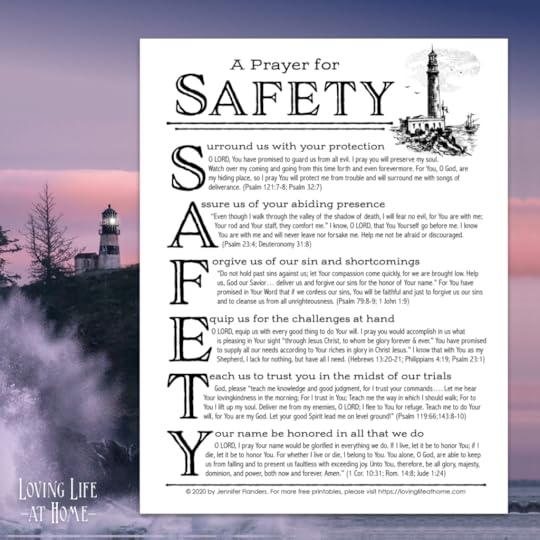
The post Prayer for Safety in the Midst of Danger appeared first on Loving Life at Home.


